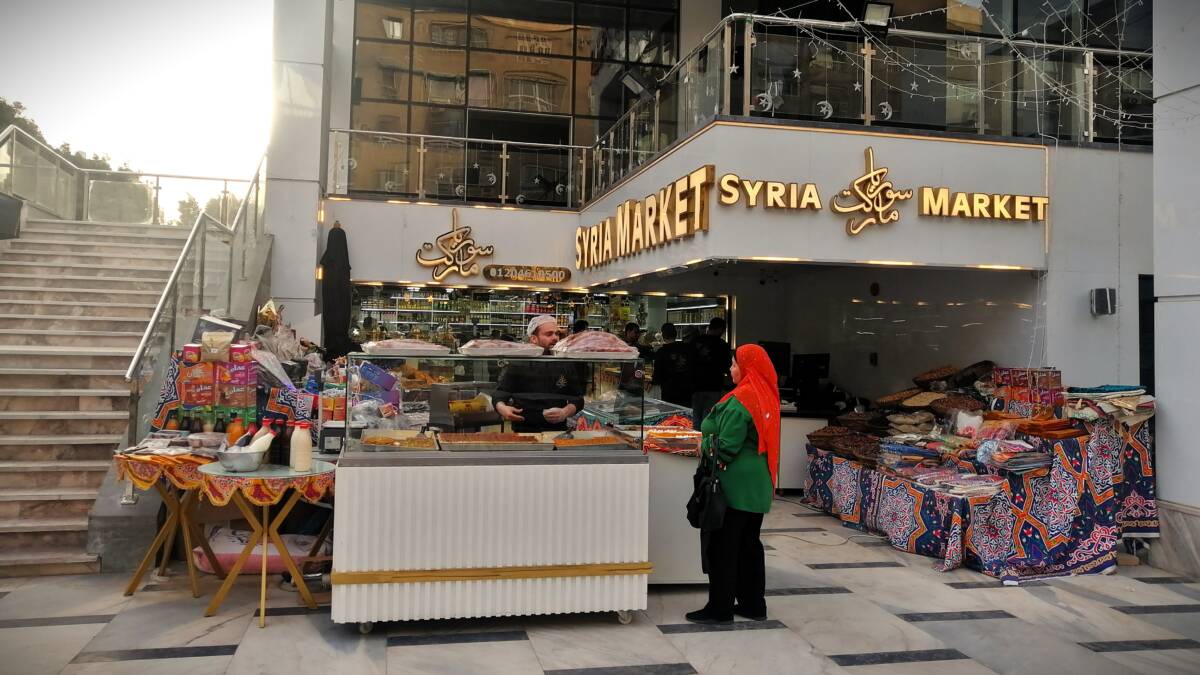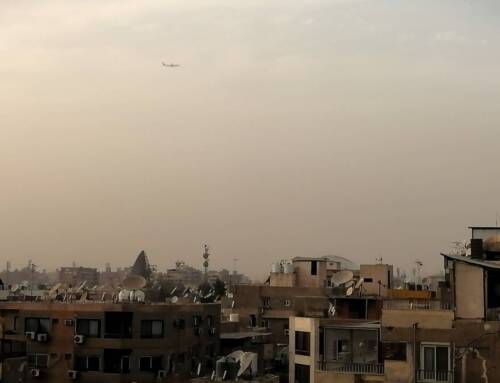In Egypt’s ‘Little Syria,’ a golden age dims
Egypt is home to 1.5 million Syrians, thousands of whom have opened successful businesses in the country. Many consider Egypt a safe haven compared to other states in the region, where anti-refugee sentiments are on the rise. However, amid a worsening economic crisis, this golden age may be nearing its end.
11 April 2024
6TH OF OCTOBER CITY/CAIRO — Nestled between towering gray buildings overflowing with tiny shops, the “Syrian Passage” is an oasis of calm. A wide alley of cafes and shisha joints surrounded by bustling commercial streets, its terraces are largely empty under the mid-afternoon sun. Waiters stand idle as customers leisurely stroll the main aisle.
When night falls, the Syrian Passage comes to life, filled with crowds drawn by what locals call the “Syrian atmosphere” of the area, which hosts dozens of restaurants, cafes and bakeries whose owners hail from different parts of Syria.
Located in the beating heart of 6th of October city—a satellite town built in the 1980s on the western outskirts of Cairo that is named for the first day of the 1973 Arab-Israeli war—the Syrian Passage is one of several so-called “Syrian streets” in the neighborhood, which is itself dubbed “Little Syria.” Waiters and customers chatter in Syrian dialect in restaurants and shops whose names allude to Syrian origins: Atyab Shami, Ahl al-Sham, Hadayek al-Sham, Halabi for Textile.
“The first time I visited this area, I was shocked,” Abdallah*, a young Syrian from Latakia who emigrated to Egypt in 2019, told Syria Direct. “I felt that I could be walking in any street in Damascus.” Many Syrian immigrants like him come here to find a taste of home.
But the colorful facades of bustling businesses mask the more complicated realities faced by Egypt’s 1.5 million Syrians, most of whom left Syria after or during the 2011 revolution and the ensuing civil war. While some successfully put new roots down in Egypt and praise the warm welcome they received, others live in poverty, struggling to make ends meet. As Egypt’s economy worsens and inflation skyrockets, xenophobic discourse is on the rise, leaving many increasingly worried about their future in the country.
Thriving businesses
Syrians make up the second-largest foreign community in Egypt, after the country’s 4 million Sudanese. The Syrian population includes at least 30,000 registered Syrian investors, who have collectively pumped around $1 billion into the Egyptian economy in recent years. Nowhere is this contribution better reflected than in 6th of October city.
“Syrian businesses fare better than ours and hire a lot of Egyptians,” Hiba, an Egyptian vendor who works at a store selling hijabs and modest fashions, told Syria Direct. Smiling, she listed numerous shops nearby that are owned or run by Syrians. “We work side by side, and they do better than us. Syrian shops are renowned for the quality of their products, and everyone likes to buy from them,” she said.
In neighboring alleys, a flurry of Egyptian, Syrian and Sudanese businesses operate cheek by jowl, offering everything from Ramadan decorations to school books, flowers to lingerie. One, a traditional Damascene hammam, is furnished with embroidered mattresses and decorated with the black-and-white arches characteristic of old Levantine buildings. The manager, 52-year-old Reham*, has spent nearly 12 years in Egypt, which she describes as a “second home.”
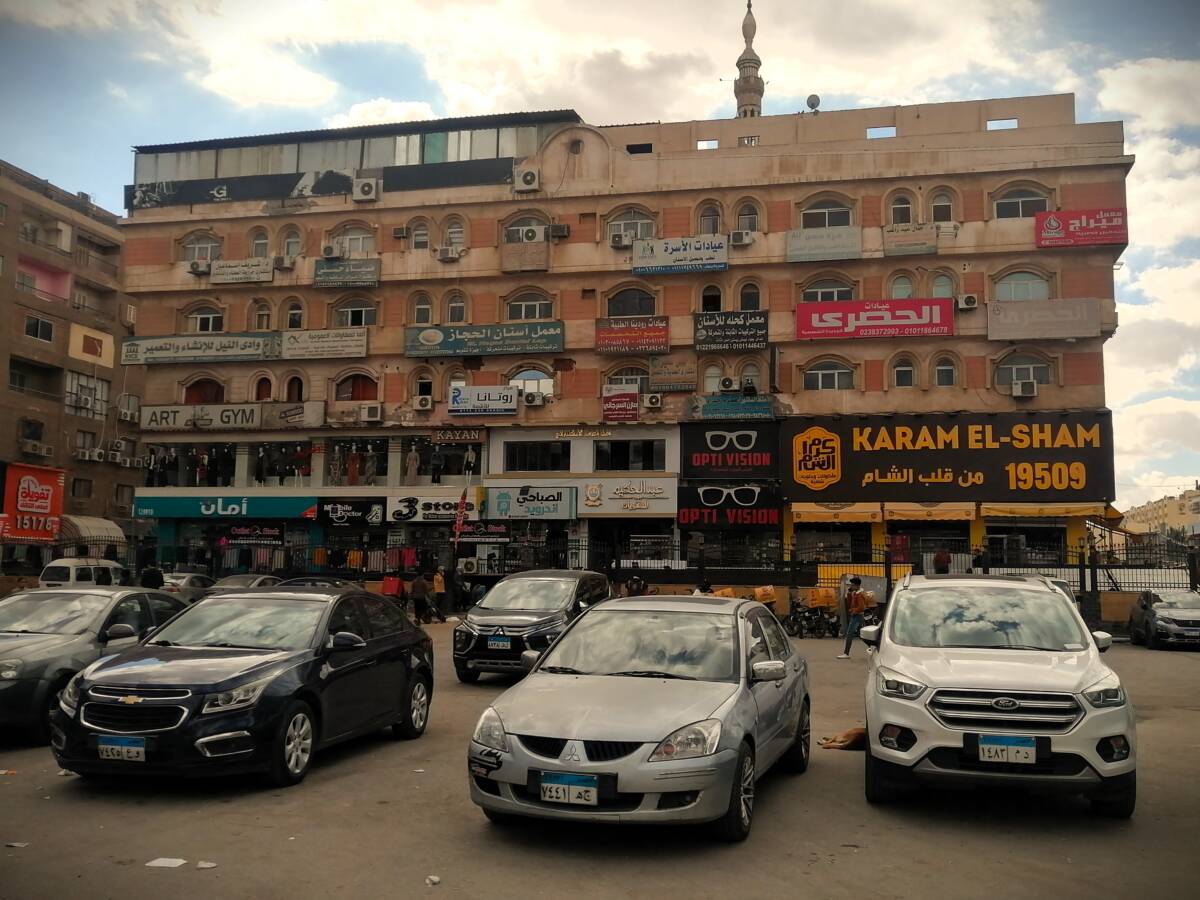
Karam el-Sham (at far right), a Syrian fast-food restaurant chain, has branches around Egypt, including in 6th of October city southwest of Cairo, 18/02/2024 (Lyse Mauvais/Syria Direct)
“I know Egypt better than my own country now,” she told Syria Direct with sparkling eyes and a voice charged with emotion. “I forgot Syria, its streets and its smells. Even after all these years, Egyptians still treat me as a guest.”
Reham came to Egypt in 2012 with her children, mother and several sisters, fleeing the war in Syria and political repression by the Syrian regime. Her brother, who stayed behind in their home on the outskirts of Damascus, was arrested in 2013 and has not been heard of since.
The family’s arrival coincided with the epilogue of Egypt’s own 2011 revolution that toppled then-president Hosni Mubarak after 30 years in power. In June 2012, Egyptians elected Muhammad Morsi, the Muslim Brotherhood’s candidate, as their new president. Morsi, who publicly supported the Syrian revolution, eased entry requirements for Syrian refugees and broke ties with Damascus in 2013.
But beyond Cairo’s sympathetic stance towards Syrians fleeing repression at home, financial considerations drew Reham and many others to Egypt. “It was affordable to live in Egypt, and we could get there without a plane ticket,” she recalled. Her family traveled overland from Syria to neighboring Jordan, where they boarded a ferry from the Red Sea port of Aqaba to Nuweiba, in the Sinai Peninsula. Once in Cairo, Reham found a job as a hammam attendant. It was the first time that she worked outside her home. “Thank God, Syrians managed to open a lot of restaurants, cafes, businesses and clothing shops in Egypt,” she said. “If you are hard-working, it’s not hard for a Syrian to find a job.”
Warm welcome
Despite losing her brother and her home in Damascus, Reham managed to settle in Egypt and felt welcomed with open arms. “Egyptians are an exceptionally kind people,” she said. Others feel similarly. “There are no words to describe how welcoming and kind Egyptians have been to me,” Abdallah, who arrived in 2019, said. “ Once, when I was traveling between two governorates, the police even asked me to step out of the car when they saw my ID, because they wanted to take a selfie with me.”
Abdallah, Reham and many other Syrians in Egypt feel that their situation is better than it would be in other host countries in the region. Unlike tens of thousands of Syrian refugees who entered Jordan and Lebanon on foot during the war and were sent to remote refugee camps, Syrians who came to Egypt quickly settled in urban areas and blended into the local population.
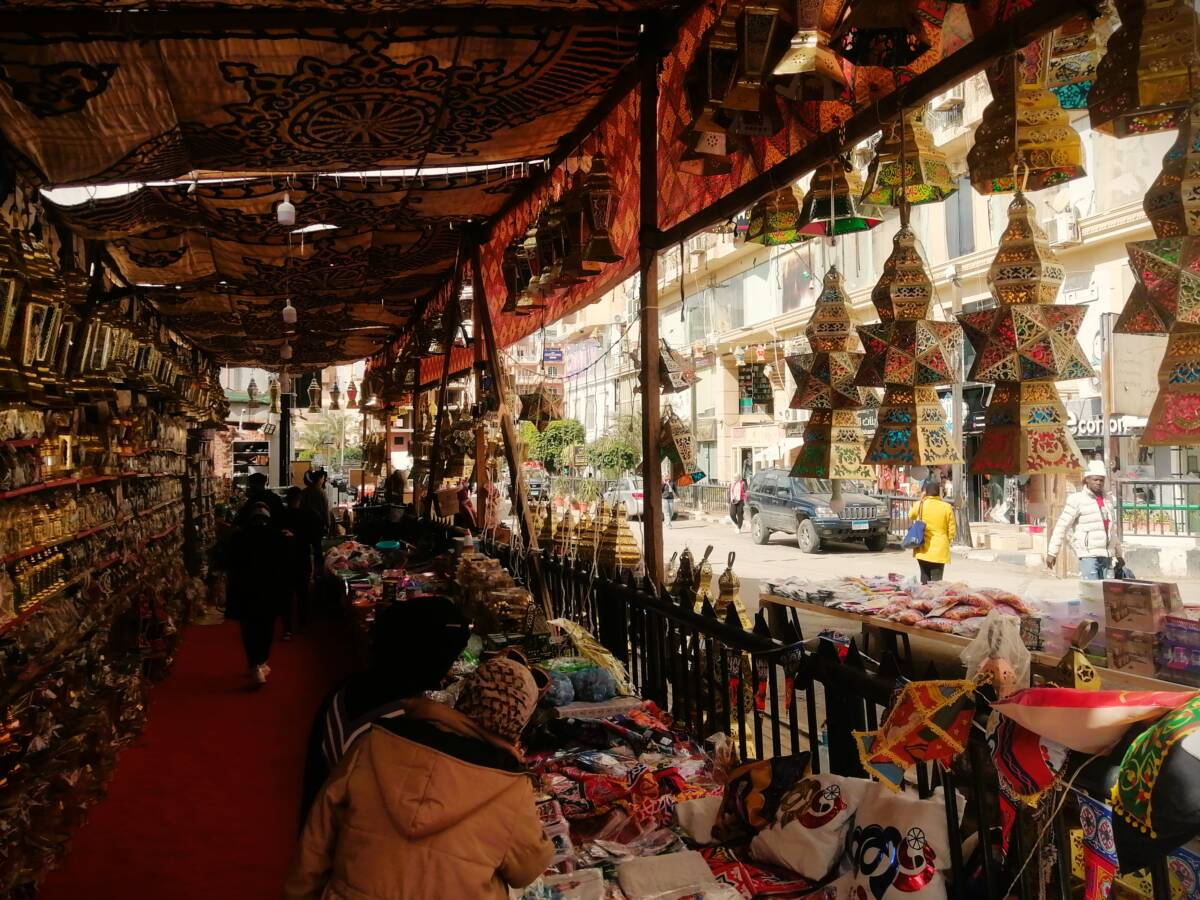
A pop-up store sells Ramadan lights and decorations on a sidewalk in 6th of October city, 18/02/2024 (Lyse Mauvais/Syria Direct)
Another perceived advantage of living in Egypt is that, while anti-refugee sentiments skyrocketed in recent years in other countries hosting a large Syrian diaspora—like Turkey and Lebanon—the country has seen comparatively less anti-Syrian discourse. There are exceptions. In 2013, in the months surrounding the fall of Morsi and his government, who were removed by a military coup led by Egyptian army chief General Abdel Fattah al-Sisi, the Syrian community faced a widespread campaign of intimidation that many still remember.
That year, Egyptian authorities introduced new requirements for Syrians to obtain security clearances before arrival, required those already in the country to formally apply for residency and started detaining Syrians who did not comply with the new rules. By November 2013, more than 1,500 Syrians had been arrested and threatened with deportation. To justify the crackdown, prominent presenters of local TV channels accused the Syrian community of siding with the Muslim Brotherhood, which had just been ousted from power.
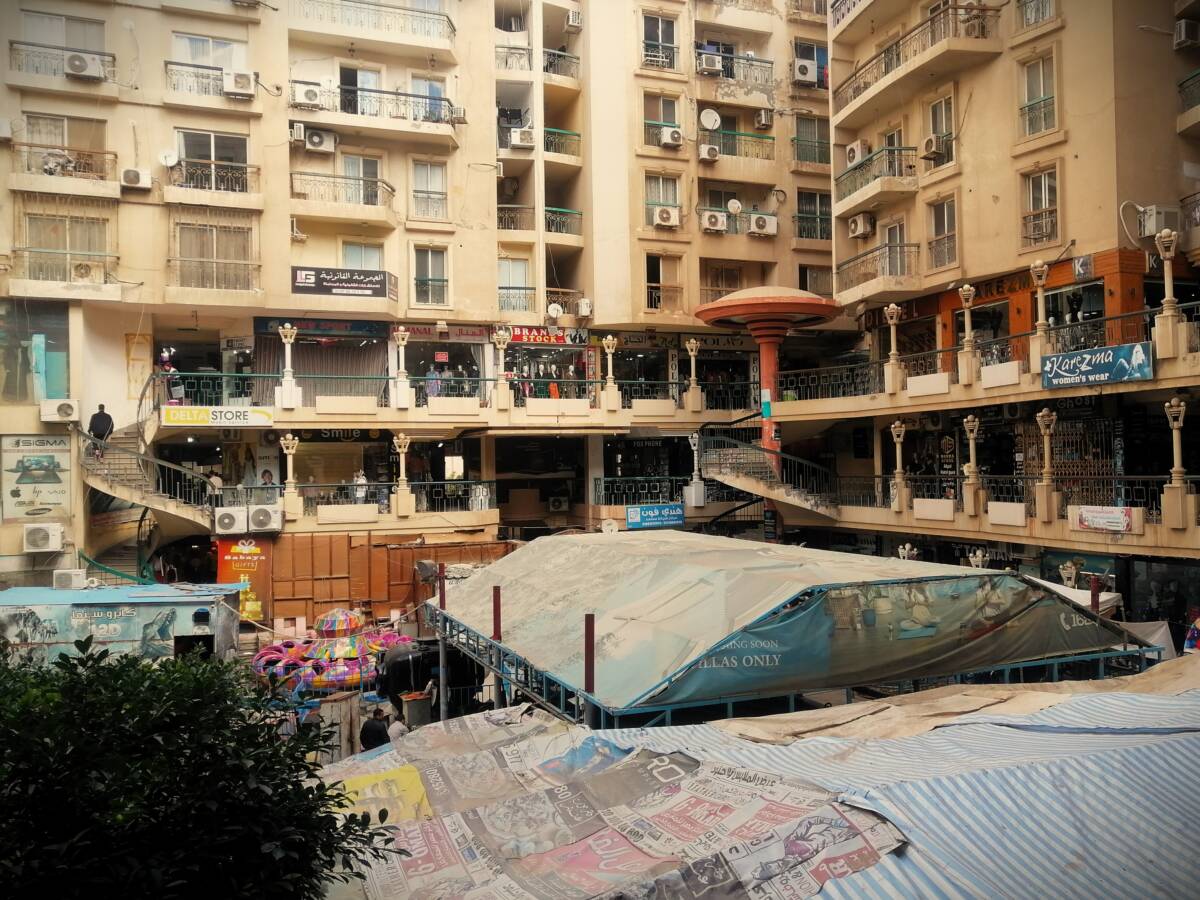
A shopping mall in 6th of October city, where Syrian, Egyptian and Sudanese-run businesses coexist, 18/02/2024 (Lyse Mauvais/Syria Direct)
This anti-Syrian media campaign eventually subsided, but outbursts of xenophobia recurred over the following years. In 2019, a prominent lawyer with ties to the Egyptian government, Samir Sabry, urged Egypt’s public prosecutor to investigate Syrian businesses’ sources of funding. He accused Syrian investors of “invading” the market and of driving up the price of real estate. In 2020, a larger-scale crackdown followed against Syrian businesses in 6th of October city, several of which were closed by the Egyptian police based on allegations that they were tied to the Muslim Brotherhood.
The latest public outpour of hate against Syrians took place on social media in January 2024, when hundreds of posts were published over the course of a few days disparaging Syrians, calling them hoarders and parasites. The campaign mostly failed to gain traction and was publicly rejected by an Egyptian government spokesperson. Still, it left some Syrians worried.
“I wouldn’t have considered leaving Egypt two years ago,” Marwan*, a 32-year-old Syrian engineer who arrived in Egypt in 2013, told Syria Direct. “But with the ongoing economic crisis, I fear that we are headed in the same direction as Lebanon, and that is a red flag for me.” Lebanon’s economic collapse has not only impacted livelihoods, but also fueled a torrential outpour of anti-refugee sentiments, discriminatory measures and the forced deportation of thousands of Syrians.
Suffocating crisis
Like several other countries in the region—including Syria, Turkey and Lebanon—Egypt is in the throes of a severe economic crisis marked by galloping inflation, in part linked to a currency crisis.
The Egyptian pound underwent two major devaluations in 2016 and 2022, reflecting the dire state of the economy. By early 2024, the official rate set by the Egyptian central bank was 31 Egyptian pounds (EGP) to the dollar—compared to EGP 6 to the dollar in 2012. On March 6, the central bank decided to abandon this artificially set exchange rate and free-float the currency, which subsequently lost 38 percent of its value and collapsed to around EGP 49 to the dollar. It currently stands at EGP 47 to the dollar.
Since many goods are imported, Egypt’s currency crisis has led to huge inflation, hitting a record high of almost 40 percent in August 2023 compared to August 2022. The price of staple foods increased by over 70 percent over the same period. In parallel, currency devaluations led Egyptians to lose much of their savings.
Meanwhile, salaries have not kept pace with the cost of living. In February 2024, the Egyptian government increased the minimum wage by 50 percent, from EGP 4,000 to EGP 6,000 ($193 at the official rate at the time, $127 as of April 2024), but the measure had no impact on those working in the informal sector, which makes up at least 58 percent of the Egyptian economy. For Egyptians and Syrians alike, the situation is catastrophic.
“When I first arrived, I was doing fine, but the cost of living has increased a lot and I’m struggling financially and psychologically,” Abu Hussein*, a 28-year–old Syrian who left Damascus in 2016, told Syria Direct over the phone. “Everyone’s biggest challenge is making a living. Salaries have dropped, and even when you get what is considered a ‘good’ salary, it’s barely enough to survive.”
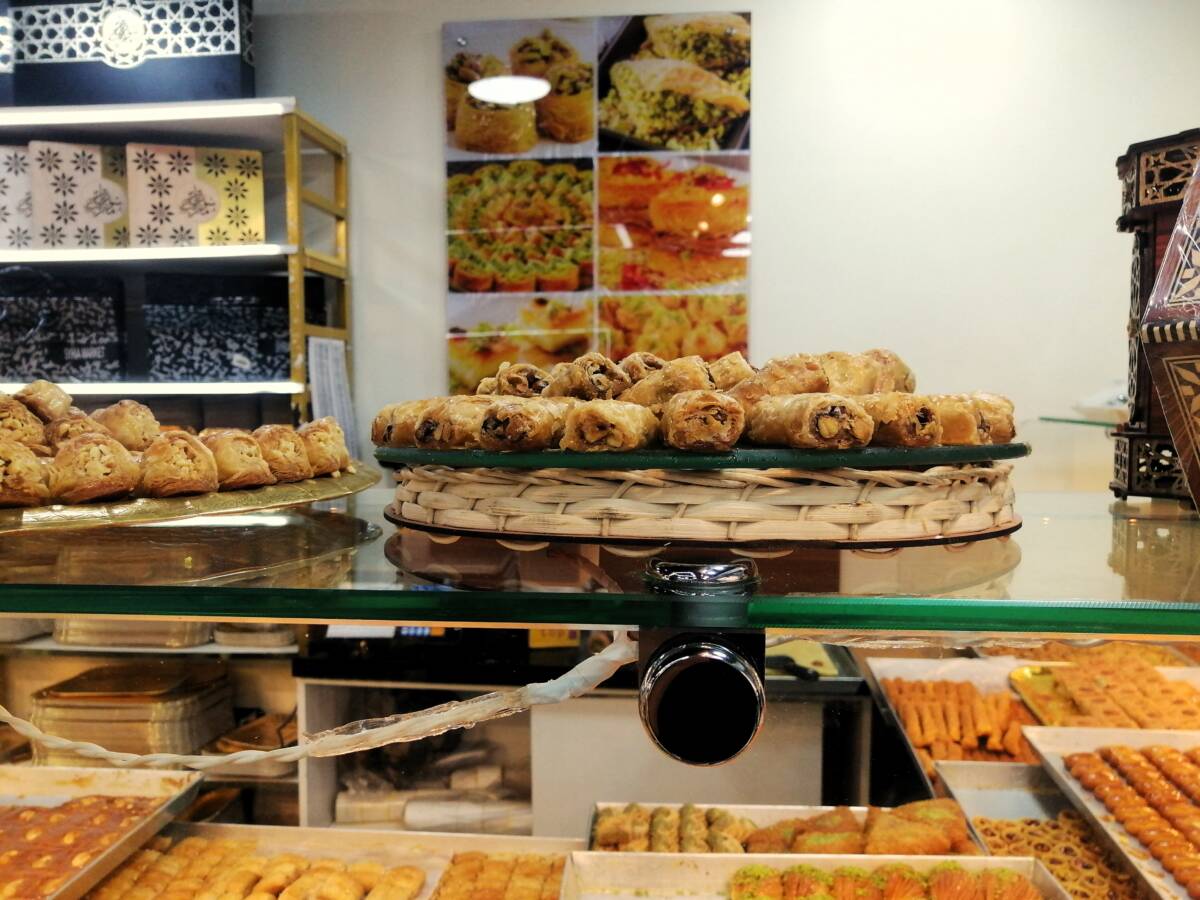
Pastries and sweets for sale in a Syrian shop in Cairo’s southern neighborhood of Maadi, 17/03/2024 (Lyse Mauvais/Syria Direct)
Like many of his friends, Abu Hussein has to work long hours to make ends meet: 10-12 hours a day, seven days a week preparing and serving food at a shawarma restaurant. A year ago, he earned the equivalent of $200 or $300 a month. Today, his salary is worth “less than $100” following the collapse of the Egyptian pound. He lives with three other young men in a small apartment, sharing a room with a friend to save on rent.
Abdallah, who is informally employed by a company selling medical supplies, faces the same issues. “I used to be able to save $100 to $150 every two or three months. Now it’s impossible to save anything. With my salary, I barely survive.”
‘Still better in Egypt’
Despite huge economic pressure, most of the Syrians Syria Direct spoke to still feel welcome in Egypt, and believe relations with their hosts will not be affected by the crisis. “Syrians and Egyptians are all in the same boat,” Reham, the hammam employee, said. “Whatever hurts them is bound to hurt us too.”
“Actually, the situation for Syrians in Egypt is difficult in every respect except this one,” Abu Hussein agreed. “The one thing that helps us get by here, one day after the next, is that we are still welcome in Egypt. In the entire world you will not find a people kinder to us than Egyptians.”
Some believe these good relations are linked to the historic ties linking Syria and Egypt, which were briefly two halves of the same country: the United Arab Republic, which lasted from 1958 to 1961. Although the union was short lived, Egypt and Syria maintained strong cultural, diplomatic and trade exchanges in subsequent decades.
Others feel that Syrians have largely been protected from widespread xenophobic attacks until now because they are still perceived as contributing to the Egyptian economy. “Most Syrians here have their paperwork in order, work, study, run a business,” Abdallah noted.“Their presence actually gives some oxygen to the Egyptian economy.”
Still, most sources said they would jump at any opportunity to travel to the Gulf or Europe, where the economic and political situation is seen as more stable. “I thought a lot about leaving Egypt given the economic crisis, but there’s no way out,” Abu Hussein said with regret. “There is no country open to Syrians anymore, and when it comes to the UNHCR, I have no hope of getting resettled abroad because there are very few spots.”
Suffocated by the economic crisis, some consider migrating to Europe through irregular channels. “A lot of Syrians are now traveling to Libya in order to board a boat to Europe,” Abdallah said. “I have a friend who took that route, because he felt that he had no future here.” Although his friend made it safely to Europe, Abdallah isn’t willing to take the same risk: “It’s a very dangerous road.”
But while many Syrians are hoping to leave Egypt, others are still trying to come. “Syrians continue to arrive, even nowadays, because they know that in Lebanon, Jordan and Turkey they will spend their life in a camp and racism is at its peak,” Aref*, a 30-year-old who arrived in Egypt in 2013, told Syria Direct. “Compared with any other country in the region, the situation is still better in Egypt.”
*Given limitations on freedom of expression in Egypt, where people are routinely arrested and prosecuted on the basis of social media posts perceived as critical of the authorities, Syria Direct has used pseudonyms for all sources in this report. This was done to allow them to share their experiences freely, without concerns for their safety.
This report is the first in a three-part series on the experiences of Syrians in Egypt.

